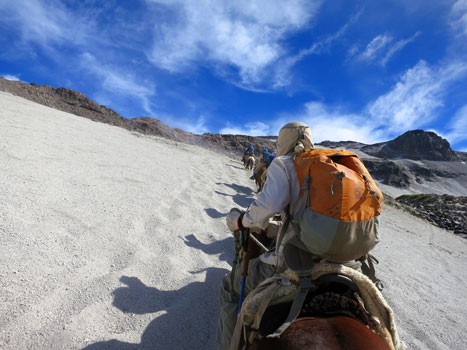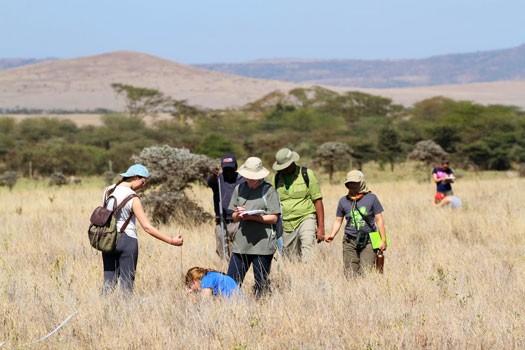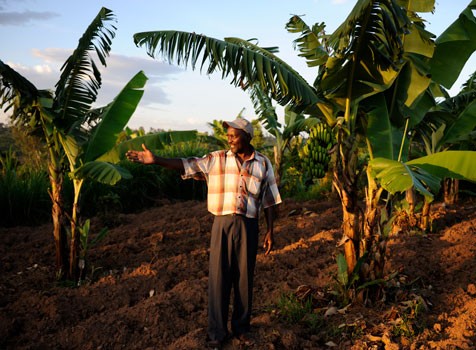Why

Because we must and because we can. Indeed, because we already are. Columbia is unquestionably a leader in climate-related work and home to the world's greatest community of climate experts. Their scientific discoveries, engineering breakthroughs, and policy recommendations are critical to the future of life on the planet. We are targeting solutions to problems like renewable energy and resilient cities as well as addressing issues of environmental justice and climate-related health. But there is much more to do, and do soon.
We know that sea levels and CO2 levels are rising. We know that extreme weather events are increasing. The impacts of climate change are not only predictable in the long term, but are visible now—from polar ice sheets to the coasts of Florida. Climate change's causes are global and complex, yet its effects are local and immediate, threatening our coastlines, our food supply, our homes, our oceans, and the quality of all life.
With the Earth Institute, Lamont-Doherty Earth Observatory, and collaborations spanning our campuses and the globe, Columbia has the scientific preeminence and interdisciplinary networks to lead in climate response. Our commitment is to ensuring that we also have the necessary focus and resources as we accelerate efforts to address one of humankind’s most urgent challenges.
The Challenge

Will we act on the scale and time frame required? Can we mobilize the human and financial resources needed immediately and for the long haul?
Our climate response is constrained in multiple ways. The problems are so sweeping they can seem overwhelming. We still don’t know enough about the processes of climate and weather to prevent or mitigate disruptions, but we need to act even as we learn more. We need new solutions—for energy, for food supply, for the design of cities, for the necessities of life, for a burgeoning global population. And we need to increase our skill in public policy making and raising the level of public understanding of these issues.
Through research, innovation, and education, as well as working with partners around the world, Columbia is demonstrating that climate change is not one but many problems, problems we must and can solve.
The Columbia Commitment

To complement the strengths of our Earth Institute and Lamont-Doherty Earth Observatory, we are building the capacity of our faculty in disciplines from political science to public health, and forging a network of experts leading the charge against the rising tide of climate change—all while encouraging teaching that will shape new generations of climate response leaders.
By enlisting new donors and advocates for climate response, we will fuel the work of the greatest community of climate experts and their partners worldwide. Our scientists and engineers are discovering core facts and devising innovative solutions. Columbia architects are rethinking cities, and we are home to climate law experts, journalists learning to communicate climate issues to the public, economists who can understand climate-related decision-making, environmental justice specialists, and policy scholars who can shape actionable solutions.
Through this evolving effort, Columbia is renewing its commitment to climate leadership.
Learn more about our commitment to Climate Response
Learn about our other Columbia Commitments
Make a gift to support the Columbia Global Centers
Related News from the Global Centers
This conference aims to present three interrelated themes through which the right to the city can be understood, articulated or negotiated. These themes include Urban Policies and Governance; Social Fabric and Urban Practices; and Living in Amman: Housing, Access, and Speculative Growth.
Columbia Global Centers, in partnership with the No-Boundaries Committee, have launched the third annual 2018 No-Boundaries International Art Exhibitions to foster global awareness and social responsibility in young citizens around the world.
Led by Khaled Malas and taking place over the course of eight meetings, a group of applicants viewed the encounter with Qusayr ’Amra as a singular lens into the continuities and distinctions associated with contemporary understandings of the first centuries of Islamicate space-making and visual culture.
The Metropolitan Museum of Art, in partnership with Columbia University, will be holding the third regional cultural heritage workshop, The Future of the Past: Addressing the Cultural Heritage Crisis in Iraq and Syria.
Believing in the power of cinema and the role it plays in people’s everyday lives, Richard Peña has been tracing film history all over the world and has been spreading knowledge about the industry. ...Peña, professor of Professional Practice at the School of The Arts at Columbia University in New York City, held courses over the week at the Columbia Global Centres in Amman named “On the Margins of American Cinemas”.